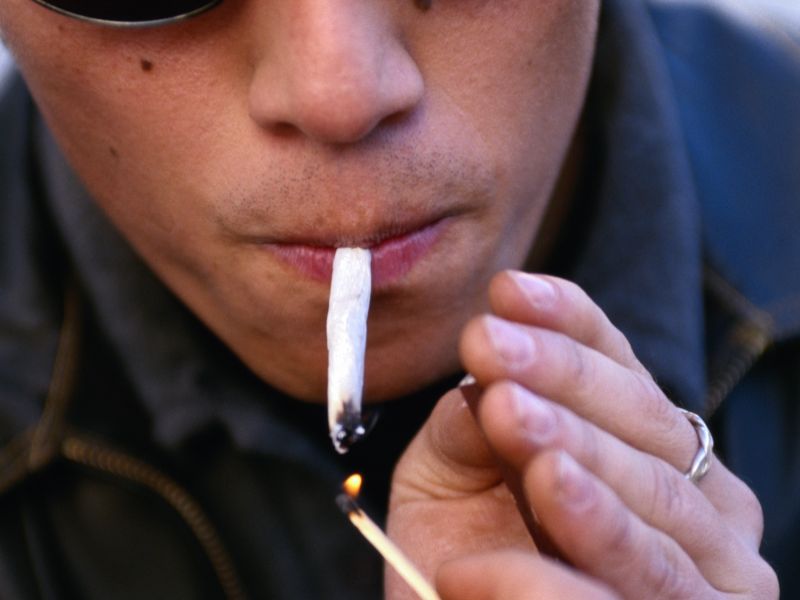Legalization of marijuana in more than half of U.S. states fueling the trend, study suggests

(HealthDay News) -- There has been an alarming increase in young Americans' exposure to marijuana ads as more states legalize the drug, a new study contends.
Recreational and/or medicinal use
of marijuana is now legal in more than half of U.S. states, researchers
from Washington University School of Medicine in St. Louis said.
"Advertising can be powerful," said study first author Melissa Krauss, a research statistician in the department of psychiatry. "That's why we're concerned that so many young adults are seeing ads for marijuana. It's also likely that younger, more vulnerable kids are seeing ads, too."
For the study, Krauss' team surveyed 742 younger people, aged 18 to 34, all of whom reported recent marijuana use. The researchers found that 54 percent had seen or sought out marijuana ads in the previous month. The ads were either online or in more traditional forms such as billboards or print media.
Marijuana advertising laws vary from state to state, but most of the survey respondents who encountered pot ads saw them on websites or social media. Even in states where marijuana ads are restricted, online ads can't be controlled, the researchers said.
And while ads for marijuana are prohibited on Facebook, "you can go on Facebook and discover pretty quickly that ads and information about dispensaries are there," Krauss said.
Even though the survey only included people who said they used marijuana, it's concerning that so many had seen ads for the drug, even in places where such ads are supposed to be prohibited, she added.
The study found that people who seek out marijuana ads tended to be users of medicinal marijuana products, were more likely to use marijuana products such as edibles and concentrates, and were more likely to be heavy users.
Those least likely to see marijuana ads used the drug recreationally, lived in states where the drug is illegal, and were more likely to smoke marijuana rather than use edibles or concentrates.
"As more states legalize marijuana, we should be vigilant about ads that promote the drug," Krauss said in a university news release.
The study was published March 29 in the journal Drug and Alcohol Dependence.
About 30 percent of people who use marijuana have some level of marijuana use disorder, which can be associated with addiction, according to the U.S. National Institute on Drug Abuse.
More information
The U.S. National Institute on Drug Abuse has more about marijuana.
"Advertising can be powerful," said study first author Melissa Krauss, a research statistician in the department of psychiatry. "That's why we're concerned that so many young adults are seeing ads for marijuana. It's also likely that younger, more vulnerable kids are seeing ads, too."
For the study, Krauss' team surveyed 742 younger people, aged 18 to 34, all of whom reported recent marijuana use. The researchers found that 54 percent had seen or sought out marijuana ads in the previous month. The ads were either online or in more traditional forms such as billboards or print media.
Marijuana advertising laws vary from state to state, but most of the survey respondents who encountered pot ads saw them on websites or social media. Even in states where marijuana ads are restricted, online ads can't be controlled, the researchers said.
And while ads for marijuana are prohibited on Facebook, "you can go on Facebook and discover pretty quickly that ads and information about dispensaries are there," Krauss said.
Even though the survey only included people who said they used marijuana, it's concerning that so many had seen ads for the drug, even in places where such ads are supposed to be prohibited, she added.
The study found that people who seek out marijuana ads tended to be users of medicinal marijuana products, were more likely to use marijuana products such as edibles and concentrates, and were more likely to be heavy users.
Those least likely to see marijuana ads used the drug recreationally, lived in states where the drug is illegal, and were more likely to smoke marijuana rather than use edibles or concentrates.
"As more states legalize marijuana, we should be vigilant about ads that promote the drug," Krauss said in a university news release.
The study was published March 29 in the journal Drug and Alcohol Dependence.
About 30 percent of people who use marijuana have some level of marijuana use disorder, which can be associated with addiction, according to the U.S. National Institute on Drug Abuse.
More information
The U.S. National Institute on Drug Abuse has more about marijuana.

No comments:
Post a Comment